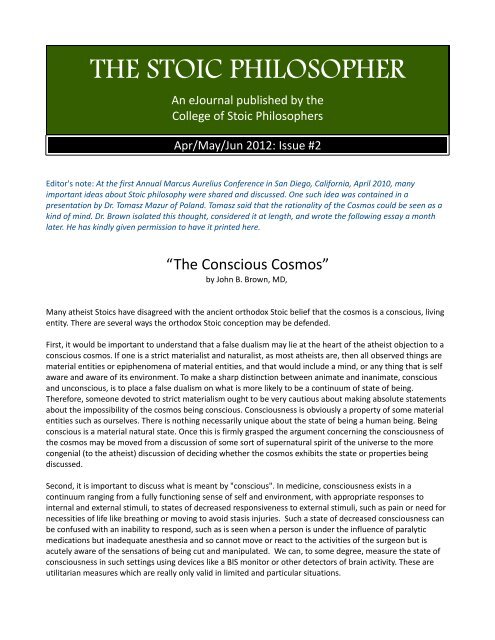The Conscious Cosmos - College of Stoic Philosophers
The Conscious Cosmos - College of Stoic Philosophers
The Conscious Cosmos - College of Stoic Philosophers
- TAGS
- cosmos
- stoic
- philosophers
You also want an ePaper? Increase the reach of your titles
YUMPU automatically turns print PDFs into web optimized ePapers that Google loves.
possible abstractions and have highly reactive brain mechanisms to deal with a complex environment.<strong>The</strong> <strong>Cosmos</strong> is its own environment and has only one reality. <strong>The</strong>re is no need for a vast machinery <strong>of</strong>reactivity and abstraction. <strong>The</strong> <strong>Cosmos</strong> is all that is, and there is no need <strong>of</strong> a brain as there is no needfor the functions <strong>of</strong> a brain. Where brains were needed within the <strong>Cosmos</strong> the laws <strong>of</strong> nature createdorder, which created complexity, which created design, which created brains out <strong>of</strong> which our mindsemerged. Those minds were created in the initial conditions <strong>of</strong> the universe interacting with theunderlying laws <strong>of</strong> existence, and therefore reflect and are part <strong>of</strong> the consciousness <strong>of</strong> the cosmos asdiscussed above.•Aren't these sorts <strong>of</strong> statements easily misunderstood as promoting a transcendent God with whom we needto have a personal relationship, give sacrifice to, propitiate with worship, etc?<strong>The</strong> <strong>Stoic</strong>s speak <strong>of</strong> hymning and praising God for what he is. Isn't it better to see the universe as deadand us as alive even if it promotes a little dualism? <strong>The</strong> answer is—No. We must face reality as it is. Onecannot be a good atheist and be a dualist. <strong>Stoic</strong>ism is not for the weak. <strong>The</strong> possibility <strong>of</strong> sloppy thinkingabout the real nature <strong>of</strong> the conscious cosmos, <strong>of</strong> “god,” does not mean that we must stop thinking.Also, the <strong>Stoic</strong>s took a more charitable view <strong>of</strong> these mistaken transcendent ideas. <strong>The</strong>y saw the realitybehind Zeus and the gods, behind the acts <strong>of</strong> worship, sacrifice and prayer – that the divine Logosproduces states which can be understood by analogy with anthropomorphic projections, and that anattitude <strong>of</strong> thankfulness and dependence on the divine Logos is a more perfect conformity with naturethan living as if one were autonomous. We live in a continuum, not in discrete micro-universes whichneed not take others into account. To know piety is to understand the nature <strong>of</strong> relationships and torecognize the claims <strong>of</strong> the the “other” on us, and, in the end, to know the ultimate illusion <strong>of</strong>otherness and self.John B. Brown graduated from the University <strong>of</strong> Washington with degrees in Biology and English, thenobtained his MD degree from the University <strong>of</strong> Southern California School <strong>of</strong> Medicine. John alsostudied <strong>The</strong>ology for a semester at the Pontifical University <strong>of</strong> St. Thomas Aquinas in Rome, Italyduring his undergraduate years.Dr. Brown enjoys amateur radio, bicycling, blogging, reading philosophy, and all things scientific, witha special interest in paleontology and molecular biology. He is an emergency room physician practicingmedicine in Moscow, Idaho. He is a former Mentor at the <strong>College</strong> <strong>of</strong> <strong>Stoic</strong> <strong>Philosophers</strong>.
















